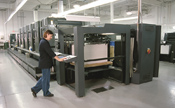
|
|
How to convert to custom manufacturing

Custom manufacturing is the oldest manufacturing system in the world. It has been used to make products since products needed to be made. With custom manufacturing, only one person is needed to make the products because they have the required skill to make the products that are being manufactured. A great example of custom manufacturing is candle making; only one person is required to make the candles.
Custom manufacturing is still used today by small and large manufacturing plants. Rather than having one person make all of the products by hand, manufacturing companies have machines to do the jobs for them. Machines are required for this manufacturing style for larger manufacturing plants because that is the easiest way to keep up with the demand from the customers. Some businesses still use the traditional method of custom manufacturing, which are companies that offer handmade items.
A great example of this would be crafts sold at fairs or boutiques. The thing you will notice with these companies is that their prices are higher than larger companies are because they have to cover the expense of making the item by hand.
|
|
If you are interested in converting to custom manufacturing here are the steps you will need to take.
Step one:
You will need to decide that you no longer want to offer products that are made from an assembly line. You want to only offer your customers custom-made products rather than producing the same products repeatedly.
Step two:
You will need to meet with your research and development team to find out what you will need to do to make this conversion. Your research and development team will also be able to tell you if this conversion is going to be right for your company or if it will be a mistake. By meeting with a team of people, you will be able to go over all of the pros and cons of changing your manufacturing style, as well as go over your budget and any questions people might have. By going over all of this, you can make an educated decision if converting to custom manufacturing is right for your company.
Step three:
You want to make sure that if you make the conversion to custom manufacturing that your business will still be making a profit. This is important because it won't make any sense to switch over to this style of manufacturing if your company will not make a profit or if your customers will no longer buy from you. Another thing you need to do is to think about if your current customers will want a custom-made product.
Step four:
You want to ensure that your businesses budget has room to go over to custom manufacturing, you want to ensure that you can afford the added expense. If your budget doesn't allow for it this year, you can work it into next year's budget.
Step five:
You are also going to need to bring in more customers because the cost of custom manufacturing is more expensive so your costs are going to increase. With the increase of costs, you are going to need to sell more products and since they are going to be custom made, you are going to need more people to sell the products too.
Step six:
You are also going to need to review your plants equipment and see if there is any equipment, you can get rid of. Many times manufacturing plants have mass production equipment that they can get rid of when they convert to custom manufacturing because they will no longer have a need for those machines. Besides getting rid of those machines can help cover the expenses of converting to custom manufacturing.
Step seven:
Hire extra people as they are needed so that you can continue to make the product for your customer's correctly, even as demand increases.
Privacy Policy, Terms of Use